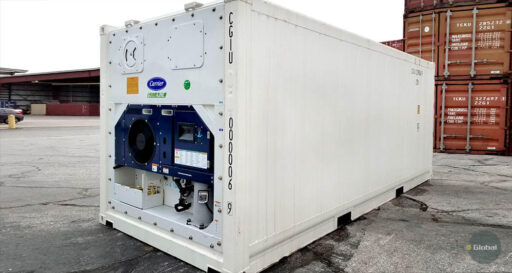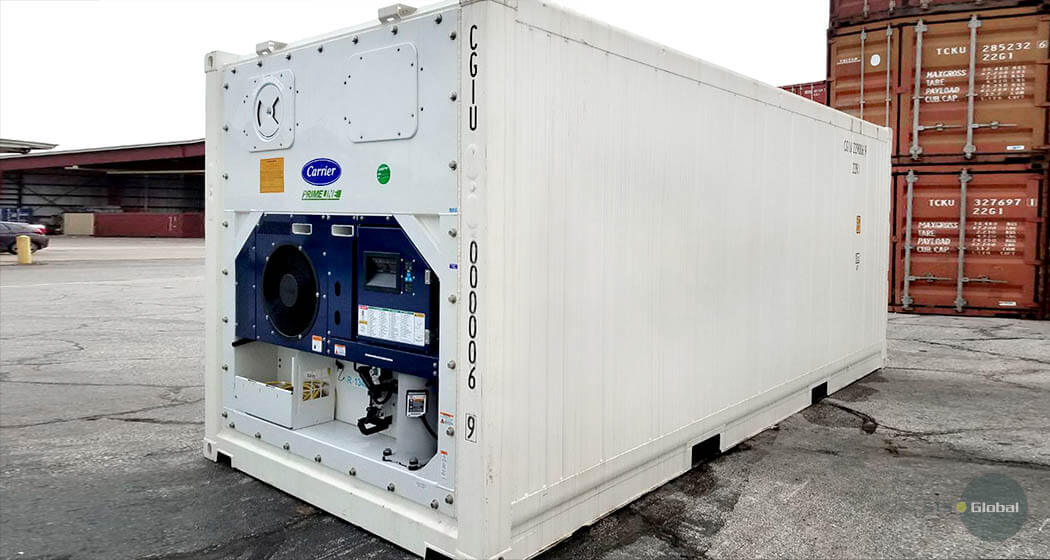The global food industry is a complex and highly regulated sector that depends on efficient logistics to ensure that perishable goods reach consumers in optimal condition.
One of the key innovations that make this possible is the use of refrigerated shipping containers, also known as reefer containers. These temperature-controlled units have transformed the way food is transported, ensuring freshness, safety, and efficiency across the supply chain. In this blog post, we explore the reasons why the food industry relies so heavily on refrigerated shipping containers.
Preservation of Food Quality and Freshness
Perishable food items such as dairy products, seafood, meat, fruits, and vegetables require specific temperature and humidity conditions to remain fresh during transportation. Refrigerated shipping containers are designed to maintain a stable environment, preventing spoilage and preserving the quality of food products. Advanced cooling technology helps maintain ideal temperatures from the point of origin to the final destination, ensuring that food retains its flavor, texture, and nutritional value.
Extended Shelf Life
By maintaining controlled temperatures, refrigerated shipping containers extend the shelf life of perishable goods. This is particularly important for retailers and wholesalers who need to store products for extended periods before they reach consumers.
For example, frozen foods transported in reefer containers can last for weeks or even months without losing their quality, reducing food waste and improving profitability for businesses in the supply chain.
Compliance with Food Safety Regulations
The food industry is governed by strict safety and hygiene standards to protect consumers from foodborne illnesses. Organizations such as the Food and Drug Administration (FDA) and the World Health Organization (WHO) have established guidelines that mandate proper temperature control during food transportation.
Refrigerated containers play a crucial role in helping businesses comply with these regulations by maintaining the required temperatures and minimizing the risk of contamination.
Global Trade and Market Expansion

Refrigerated shipping containers have made it possible for businesses to expand their markets beyond local regions. With reefer containers, fresh produce from tropical countries can reach supermarkets in colder regions, and seafood caught in one part of the world can be enjoyed in another.
This ability to transport perishable goods over long distances has fueled international trade and increased access to a diverse range of food products worldwide.
Reduction in Food Waste
Food waste is a significant global challenge, with a large portion occurring due to spoilage during transportation and storage. Refrigerated containers help reduce food waste by providing a stable environment that minimizes spoilage.
With better preservation, businesses can reduce losses, cut down on costs, and contribute to sustainability efforts by ensuring that more food reaches consumers instead of being discarded.
Cost-Effective Logistics Solution
Refrigerated shipping containers provide a cost-effective solution for transporting perishable goods. They eliminate the need for more expensive air freight in many cases and allow for efficient large-scale transportation by sea, rail, or road. Businesses can move bulk quantities of food at a lower cost while maintaining the required storage conditions.
Versatility and Flexibility
Refrigerated containers are highly versatile and can be used for various types of perishable goods, including fresh produce, frozen foods, dairy products, and pharmaceuticals. Their modular nature allows businesses to adjust temperature settings based on the specific requirements of different products. Additionally, reefer containers can be easily integrated into existing supply chain systems, offering flexibility for businesses of all sizes.
Advanced Technology for Monitoring and Control
Modern refrigerated shipping containers come equipped with advanced technology that enables real-time monitoring of temperature, humidity, and other critical parameters. Businesses can track shipments remotely and receive alerts if any deviations occur, allowing for immediate corrective actions. This level of control enhances food safety and minimizes the risk of product loss due to temperature fluctuations.
Support for Sustainable Practices
Sustainability is a growing concern in the food industry, and refrigerated containers contribute to eco-friendly logistics solutions. Many reefer containers are now designed with energy-efficient cooling systems that reduce carbon emissions. Additionally, by preventing food spoilage, refrigerated shipping containers help minimize food waste, which in turn reduces the environmental impact of discarded food.
Reliable Supply Chain Operations
A reliable and efficient supply chain is essential for the food industry. Disruptions in transportation can lead to significant losses, impacting businesses and consumers alike. Refrigerated containers provide a dependable solution by ensuring consistent and uninterrupted cold chain logistics. Whether moving goods by sea, land, or rail, reefer containers help maintain supply chain integrity and ensure that food products arrive in optimal condition.
Final Thoughts
The food industry’s reliance on refrigerated shipping containers is undeniable. From preserving food quality and extending shelf life to ensuring regulatory compliance and enabling global trade, these containers play a vital role in modern food logistics.
As technology continues to evolve, refrigerated shipping containers will become even more efficient, helping businesses improve sustainability, reduce costs, and provide consumers with safe, high-quality food products. Whether for local distribution or international trade, reefer containers remain an indispensable asset in the food supply chain.


